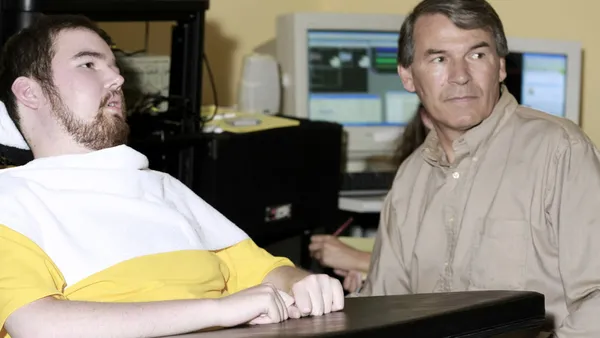Eye For Film >> Movies >> Father Of The Cyborgs (2021) Film Review
Father Of The Cyborgs
Reviewed by: Jennie Kermode

They call Phil Kennedy the father of the cyborgs, a man intelligent enough to connect the brains of paralysed people to computers, giving them back a means of connecting with the world, yet not smart enough to tell his girlfriend before undergoing elective surgery on his own brain. He's the kind of subject who makes a documentarian's life easy, yet director David Burke has gone all out to make this film visually interesting and richly contextualised. If you have no prior knowledge of this type of science then it may take you a little while to find your feet. If you know it well, you'll find this more interesting as a character study than revelatory. Either way, it's a stimulating experience.
This is the kind of subject routinely described by outsiders as "more like science fiction than science fact," and accordingly Burke opens the film with clips from assorted science fiction films, reminding us that we have to imagine before we can do. This is a neat way to introduce ethical concerns around the idea of building brain/computer interfaces (or 'interfering' with the brain at all) and to put most of them in their proper place - no more than a reworked version of old terrors about surgeries which are commonplace today and have saved or improved millions of lives. This clears the way to talk about the real issues, and as the science fiction clips give way to old news archive footage there's a discussion of mind control technology. It's neatly illustrated by footage of a bull charging towards Yale neuroscientist José Delgado in 1970, stopped in its tracks and completely relaxed when he pressed a button.

This is one area of interfacing which Kennedy wants nothing to do with. He has one other major point of concern: he wants to be guaranteed control of the information leaving his brain. Nobody is getting to read his mind. But with those two things accounted for (and a quiet acknowledgement that scientists refusing to engage doesn't mean that the powerful will never find ways to exploit such possibilities), there are a great many positive things that it could do. Here the film addresses the way that numerous innovations made for disabled people have ultimately benefited the wider population. What if everybody could connect to the internet through their mind? What if we could use computers for memory and reserve more space in our far more agile brains for processing information, for understanding it and doing our own creative and innovative work?
The past decade has seen a revolution in assistive technologies to help disabled people move around and manipulate objects. Kennedy found, however, that when he asked those with severe paralysis about their priorities they rated the ability to speak as far more important. We see some of his experimental patients - his cyborgs - here, and get an indication of what it means "to feel human again." The process didn't work for everyone, though, and was complicated by the small number of suitable (and willing) patients available and by the fact that some of them had additional health problems. Ultimately, Kennedy saw only one practical way forward: to experiment on himself.
"It's my brain and I'll do what I like with it" sounds fair enough on the surface, but of course it's not that simple. Kennedy's family were apparently hurt by his decision, with only one relative speaking here, and the doctor who carried out the operation, in the popular medical tourism destination of Belize, also felt uncomfortable about it. The real question is: was it worth the risk? Kennedy feels that it provided him with invaluable data. It came at some reputational cost, especially as he chose to follow it up with television interviews, but ultimately he seems less interested in his own progress than in the advancement o the science itself, which also requires that the public have some sense of its possibilities - perhaps the reason why he chose to get involved with this film.
If the film has a major fault, it's that its choices of imagery sometimes give the impression that this is an impossibly complex field which only a genius could succeed in. Kennedy strives to argue that, in fact, we have the basic tools and roadmap already - we just need to acquire more data and carry out more experiments. Famously dismissive of the elaborate projects proposed by the likes of Elon Musk, he insists that the basic of connecting the brain to a computer don't need to very sophisticated. At the very end, the film touches on new, non-invasive approaches which are opening up promising areas of exploration.
As this field inevitably expands, there's a danger that wealthy dilettantes like Musk with powerful publicity machines could take credit for its early development, a dangerous possibility in light of the fact that big business may not show much interest in Kenney's ethical boundaries. This film highlights the very different, human-centric approach that is still possible. It's a piece of still-living history which we should cherish, because in order to do this the right way, we must first imagine.
Reviewed on: 18 Jun 2021

















